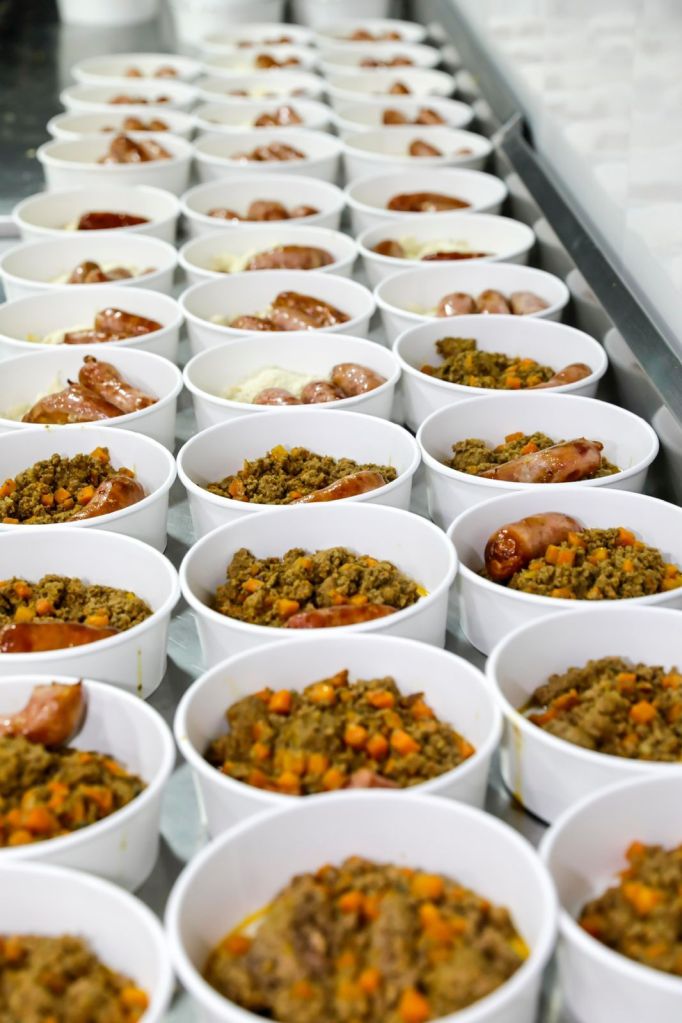The news that today more than 33 million Brazilians are hungry shocked the country in recent days. But above all it shocked those whose job and mission is precisely to feed people.
The number of the millions of needy is of the 2nd National Survey on Food Insecurity in the Context of the Covid-19 Pandemic in Brazil , published last Wednesday (8) by the Brazilian Research Network on Food and Nutrition Sovereignty and Security. According to the report, six out of ten households do not have full access to food, and live with uncertainty about the next meal.
The pandemic was a major aggravating factor of this insecurity, as the survey’s own motto reveals. The number of people without food has doubled since 2020, according to the comparison.
But this is the aggravation of a situation of years, as the series history of the Brazilian Institute of Geography and Statistics (IBGE) : for at least nine years the indicators of hunger have worsened.
It is because of the continuous worsening of this situation that some actors in the Gastronomy and Food sector were already developing initiatives to combat food insecurity.
From the donation of lunch boxes to the full use of food, avoiding waste, CNN Travel & Gastronomy met some actions that seek to attack food insecurity from within the sector.
Combining social awareness and gastronomy, these initiatives want to put into practice the original meaning of the term “restaurant”: to restore, to recover those in need.
Hunger for food, hunger for knowledge
“In the 1990s, my grandmother brought people who were starving into her house. She always told me: ‘You don’t need the industry to make a good stir-fry’”, recalls chef Dona Carmem Virginia, responsible for Altar Cozinha Ancestral, a restaurant in the Santo Amaro neighborhood of Recife.
The memory also has to do with the delicate moment of national food: “I see myself back in those decades, with those 33 million people starving. Six years ago, we had eradicated this situation”, he laments.
It is because she keeps this memory of her grandmother, added to the perception of the increase in poverty around her, that Carmem has been leading initiatives for the preparation and donation of lunchboxes from her restaurant.
His action has become even more necessary in recent weeks, with the heavy rains and floods that have devastated vulnerable communities in the capital of Pernambuco.
“With this situation, the restaurant started distributing 100 lunchboxes daily, in addition to basic food baskets. Although the rains have subsided, people are returning to their homes and realizing that they have nothing. So we will continue the action in the coming months,” he explains.
Her action is a rescue of sharing practices that mark the chef’s own trajectory. “Altar has just started, but I’ve been doing this work in my terreiro for 15 years. Not only with food distribution, but also with cooking courses, with the idea of empowering women and people in general”, she says.
Hunger, in his view, relates to a broader problem of lack of access not only to food, but also to knowledge about nutrition and what we consume.
“I saw campaigns on the networks of people making donations. Donating sausage, for example, which costs R$ 14.90 per kilo. Much more expensive than sardines, than couscous. In 100 grams of sardines, we have more calcium than in a glass of milk. Neither the food nor the knowledge about it reaches the population”, she reflects.
The lunchboxes, produced by Carmem with the voluntary help of the Altar kitchen workers and the help of donations, are not just “fuel”. There is a culinary and pedagogical work, which aims not only to feed the urgency of hunger, but to re-include these people in the socio-affective aspects of food.
“The lunchboxes have sardines, pasta, couscous farofa, chicken, rib soup”, he says, removing the idea that those who are food insecure could dispense with greater care with the food they receive.
“What people need is solidarity, affection, and, above all, nutrients”, summarizes Carmem.
Food beyond merchandise

Realizing early on the impact that the pandemic would have on the food of an impoverished population, in March 2020 the researcher and historian Adriana Salay launched with her husband Rodrigo Oliveira chef at Mocotó, the project Fed break .
“It is no longer possible to treat food as a commodity. If so, it takes money to consume it. And people don’t have money,” she explains. From this perspective, the initiative has already distributed more than 100 thousand lunchboxes. In 2021, Quebrada Alimentada was recognized for its social action in the Latin America’s 50 Best Restaurants award.
Today, there are about 50 meals a day, offered in front of the restaurant, which is located in Vila Medeiros, in the north of São Paulo, a poor region of the city. The families served are referred by Basic Health Units (UBS), according to their situation of vulnerability.
Despite having this intense contact with the population, Adriana admits surprise with the numbers revealed by the survey this week: “We didn’t have the dimension of how bad it is. With the current economy and its unemployment rate, the worsening was significant”.
The situation was also complicated within the restaurant itself, pressured by the same crisis.
“We also had a very large drop in revenue. The lunchboxes we distribute are paid for by Mocotó, but we also donate basic food baskets monthly. Before, there were 450 families, but we lost partnerships”, he says, revealing a generalized impoverishment that may explain the seriousness of the numbers revealed by the Brazilian Research Network on Food and Nutrition Sovereignty and Security.
The way out is to have a more comprehensive view of food and meal production, to rationalize resources and ensure that all food finds a stomach, not garbage.
“We have a waste control system, to help us tell us what are the measures to prevent the reason for leftover cassava puree, for example”, says Adriana. “In addition, we have a biodigester that produces a ton of fertilizer per month, which is then taken to be used in our plantation”, he says, referring to the Mulungu Orgânicos Site, where some of the inputs used in Mocotó and also in the lunchboxes.
From the field to (all) table
Since its opening in 2018, the Corutch assumed sustainability as a principle, aiming not only at a better environmental awareness, but also at producing a social impact.
“The idea is not only to change the way people consume, but to transcend the restaurant, their homes, and produce a new look”, according to chef Cesar Costa, founder of the restaurant located in Vila Madalena, in São Paulo.
With training and experience in restaurants in England and Denmark, he decided to import a “policy for managing opportunities, not just waste”, he explains. “It is a concern not only about where the food comes from, but also where it goes, and what other place it can occupy in the prison”, adds Costa.
Certified by the Sustainable Restaurants Association, an English institution dedicated to reducing waste in the food sector, the house bets on strategies such as buying inputs in large quantities and from local and nearby producers.
Tens of kilos of cocoa and corn, for example, arrive in huge sacks and are processed in the kitchen itself, turning chocolate and flour into polenta. The preparation of the menu is guided by the principle of using the ingredient in its entirety, in addition to offering dishes that expose the biodiversity of Brazilian cuisine.
Even what Corrutela cannot reuse ends up being sent to the house’s own composter, which becomes fertilizer and recirculates among the producers. “We really managed to close the food cycle”, comments Costa.
In 2021, these initiatives were also awarded, as well as Quebrada Alimentada, in Latin America’s 50 Best Restaurants, but in the “Flor de Caña Sustainable Restaurant Award” category.
In addition to helping to make the use of ingredients more rational, reducing waste, these measures generate economic benefits for both the house and its production chain. “Encompassing all processes cuts costs with middlemen, in addition to making us less vulnerable to inflation, the rise in the dollar, for example”, adds Costa.
Corrutela closed in April 2021, amid the worsening of the Covid-19 pandemic, precisely because it was unable to maintain its good practices in that scenario – Costa is averse to delivery, for example, by concept and due to the high generation of waste involved in deliveries .
The house reopened a year later, last month – and this fresh start, amid the resurgence of food insecurity in the country, sharpened the certainty that the house’s choices contributed to fostering another reality in gastronomy.
“Insecurity transcends the field of gastronomy. It depends on the actions of several actors – after all, everyone has to eat. What we can do is also feed the conscience, so that we can share this responsibility and its impacts”, concludes Costa.
Source: CNN Brasil







